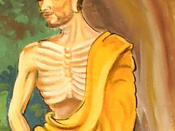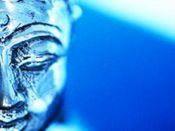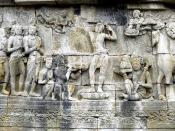Siddhartha Gautama was born in Lumbini, Nepal around the year 563 BC. He was the son of two important great people. Siddhartha's father's name was Shuddhodana, the King of the Sakyas. His mother, Queen Maya, was a lady "of perfect form and bee-black tresses, fearless in heart and full of grace and virtue." Siddhartha got his name from one of his mother's dreams. When she told her husband about her dream, he called Brahmins, or taught men to interpret it. They predicted that the child one-day would be the greatest king in the world or the greatest ascetic in the world. So that's why they called him Siddhartha, meaning "he whose aim is accomplished." When Siddhartha was about 20 years old he married Yasodhara, who was the daughter of one of the King's ministers. Siddhartha and his new wife had a child a year after they got married. They called their son Rahula, which means "impediment."
Nine years later Siddhartha asked his charioteer to take him for a ride throughout the city. While riding he saw three things he had never seen before. One was an old man, another was a man suffering from illness, and finally he saw a dead body surrounded by mourners. The last sight he saw was a wandering old holy man with no possessions or a wandering ascetic. According to legend he left his family and wealth to find the cause of human misery.
In his teachings, the Buddha learned many elements of the Hinduism of this time, including the teachings of Samsara and Karma. However, Buddha differed from Hinduism in some important aspects. For example the Buddha opposed the animal sacrifices. Hinduism made much use of animal sacrifices to various gods, because this was the way that the Hindu's thought they would reach Nirvana.


